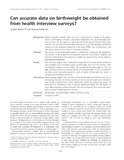| dc.creator | Robles Soto, Arodys | |
| dc.creator | Goldman, Noreen | |
| dc.date.accessioned | 2015-05-26T19:53:50Z | |
| dc.date.available | 2015-05-26T19:53:50Z | |
| dc.date.issued | 1999 | |
| dc.identifier.citation | http://ije.oxfordjournals.org/content/28/5/925.full.pdf+html | |
| dc.identifier.issn | ISSN 1464-3685 | |
| dc.identifier.issn | 0300-5771 | |
| dc.identifier.uri | https://hdl.handle.net/10669/13340 | |
| dc.description | Artículo científico -- Universidad de Costa Rica, Instituto de Investigaciones en Salud. 1999 | es_ES |
| dc.description.abstract | Background: Because hospital records rarely exist for a representative sample of the population in developing countries, researchers frequently rely on birthweight data from surveys. Yet, the quality of these data has rarely been evaluated. This study explores the accuracy of birthweight information ill SIR demographic and health surveys in Latin America conducted in the early 1990s: two in Guatemala, and one each in Bolivia, Costa Rica, El Salvador and Peru. Methods: The quality of the birthweight reports is assessed by examining the plausibility of estimates of the proportion of newborns reported to have been weighed and estimates derived from the numerical weights, by characteristics of the delivery and maternal education. Results: The estimates suggest that a substantial proportion of women whose newborns were probably never weighed report a birthweight. For all of the surveys, with the possible exception of Costa Rica, the average birthweights appear to be too high, and the estimates of the prevalence of low birthweight too low. In addition, the data reveal anomalous patterns, such as higher birthweights for home as compared with hospital deliveries. Conclusions: These findings suggest that estimates of low birthweight derived from surveys in developing countries are likely to portray an overly optimistic picture of children's and women's health status. More information about the underlying source of these data are needed not only to provide additional insight into the degree of error characterizing existing estimates, but also to improve data collection strategies in future health interview surveys. | es_ES |
| dc.description.sponsorship | Universidad de Costa Rica. Instituto de Investigaciones en Salud. | es_ES |
| dc.language.iso | en_US | es_ES |
| dc.source | International Journal of Epidemiology, 1999, 28(5): 925-931 | es_ES |
| dc.subject | birthweight | es_ES |
| dc.subject | Salud pública | es_ES |
| dc.title | Can accurate data on birthweight be obtained from health interview surveys? | es_ES |
| dc.type | artículo original | |
| dc.identifier.doi | 10.1093/ije/28.5.925 | |
| dc.description.procedence | UCR::Vicerrectoría de Investigación::Unidades de Investigación::Ciencias de la Salud::Instituto de Investigaciones en Salud (INISA) | es_ES |


